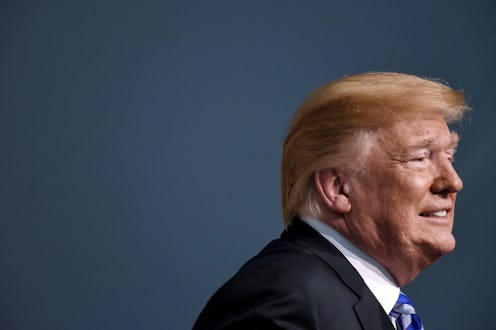News
This Is What Could Happen If Trump Actually Decides To Pardon Himself

On Monday morning, President Trump tweeted an attack on the special counsel investigation into Russian election meddling and entered whole new waters, paddling even closer to a constitutional crisis. Trump tweeted that he has "the absolute right" to pardon himself. In the same tweet he claimed that he wouldn't. But if Trump pardoned himself, what would happen is completely new ground.
Trump tweeted Monday:
As has been stated by numerous legal scholars, I have the absolute right to PARDON myself, but why would I do that when I have done nothing wrong? In the meantime, the never ending Witch Hunt, led by 13 very Angry and Conflicted Democrats (& others) continues into the mid-terms!
About an hour later, he wrote, "The appointment of the Special Counsel is totally UNCONSTITUTIONAL! Despite that, we play the game because I, unlike the Democrats, have done nothing wrong!"
Former U.S. attorney Preet Bharara, fired by Trump's attorney general, Jeff Sessions, said that if the president were to pardon himself, he would almost certainly be impeached. "I think (if) the President decided he was going to pardon himself, I think that's almost self-executing impeachment," Bharara told CNN's State of the Union.
"Whether or not there is a minor legal argument that some law professor somewhere in a legal journal can make that the President can pardon, that's not what the framers could have intended," Bharara continued. "That's not what the American people, I think, would be able to stand for."
Trump is not the only one who has argued publicly that he has the right to pardon himself. Rudy Giuliani, the former mayor of New York who has joined Trump's legal team, said on ABC's This Week that Trump "probably" has the right to, even if the president would never do it.
"He has no intention of pardoning himself," Giuliani said. "It would be an open question. I think it would probably get answered by gosh, that's what the Constitution says, and if you want to change it, change it. But yes."
One thing that Giuliani and Trump's critics agree on, though, is that it would be a bad move politically and lead to "immediate impeachment." Giuliani continued, "President Trump is not going to do that. He's obviously not going to give up any of his pardon powers, or any future president's pardon powers, but under these circumstances he's not going to do that."
The Senate minority leader, Chuck Schumer, disagrees. Schumer wrote on Twitter, "Mr. President - you are 0 for 2 on the Constitution this morning."
All of this back and forth comes after The New York Times published a letter from Trump's legal team to Special Counsel Robert Mueller. In it, Trump's lawyers argue that the president cannot have obstructed justice because of his pardon power. They wrote:
It remains our position that the President’s actions here, by virtue of his position as the chief law enforcement officer, could neither constitutionally nor legally constitute obstruction because that would amount to him obstructing himself, and that he could, if he wished, terminate the inquiry, or even exercise his power to pardon if he so desired.
The letter goes further to suggest that the special counsel's investigation has been a hindrance on the presidency and has even "has endangered the safety and security of our country, and has interfered with the President’s ability to both govern domestically and conduct foreign affairs."
This could be the line of argument that Trump is using in his second tweet about the investigation. There may be plenty to disagree on, but Trump's pardoning himself — regardless of its legality — would be a reckless move.